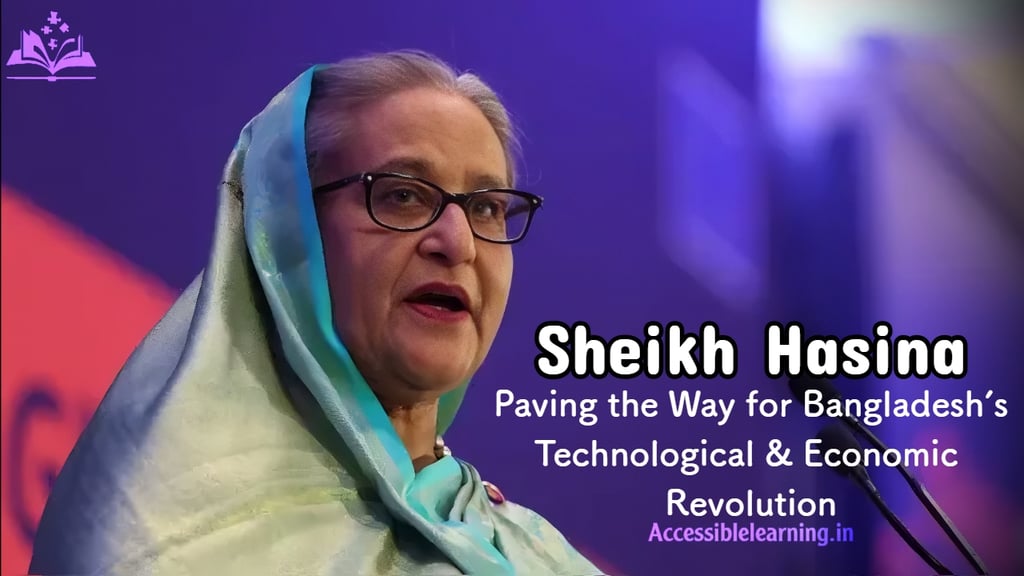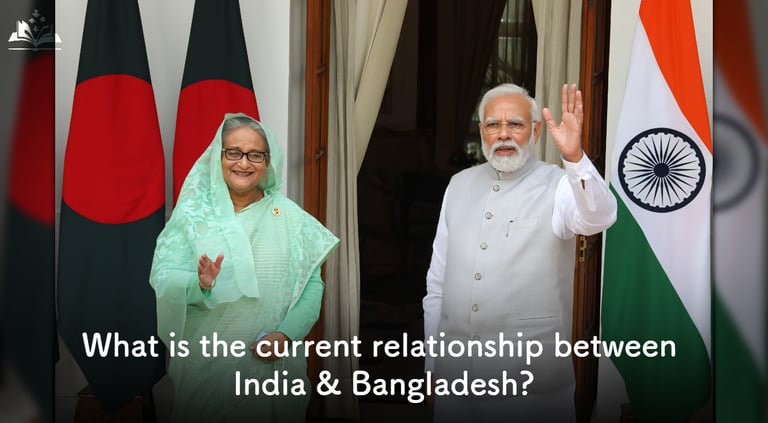
Sheikh Hasina: A Legacy of Leadership and Progress in Bangladesh!
Sheikh Hasina, the Prime Minister of Bangladesh, has become an enduring symbol of leadership, resilience, and national progress. As the daughter of Bangladesh's founding father, Sheikh Mujibur Rahman, Hasina has played a pivotal role in shaping her country's economic, social, and political landscape. This article delves into her early life, political journey, challenges, and remarkable achievements in transforming Bangladesh into one of South Asia's fastest-growing economies while addressing key humanitarian issues.
BANGLADESHBIOGRAPHYPOLITICAL JOURNEYEDUCATION/KNOWLEDGE
Kim Shin
12/29/20248 min read


Sheikh Hasina, the Prime Minister of Bangladesh, is a formidable figure in global politics and an enduring symbol of resilience, leadership, and national progress. As the daughter of Bangladesh's founding leader, Sheikh Mujibur Rahman, Hasina has not only carried the legacy of her father but also carved her own path, shaping the future of the nation. With her leadership spanning over three decades, her tenure has seen both challenges and triumphs as she steered Bangladesh toward economic development, social reform, and international recognition.
Early Life and Political Beginnings
Sheikh Hasina was born on September 28, 1947, in Tungipara, a small village in the Gopalganj district of Bangladesh. She is the eldest child of Sheikh Mujibur Rahman, the first President and Prime Minister of Bangladesh, and Begum Fazilatunnesa Mujib. From a young age, Hasina witnessed her father's political journey and the struggles for independence that ultimately led to the creation of Bangladesh in 1971. Her father’s role as the "Father of the Nation" left an indelible mark on her, shaping her worldview and political ambitions.
The assassination of her father and most of her family members in 1975 during a military coup marked a traumatic turning point in her life. Sheikh Hasina and her sister, Sheikh Rehana, who were abroad at the time, survived the massacre. However, the loss of her family members was a pivotal event that pushed Hasina further into the political arena, determined to continue her father’s work and ensure the democratic future of Bangladesh.
The Road to Power!
Sheikh Hasina returned to Bangladesh in 1981 after spending years in exile. She was immediately thrust into the political landscape when she became the leader of the Awami League, the political party founded by her father. Despite facing numerous challenges, including political turmoil and military rule, Hasina’s resolve remained unshaken. In 1996, she became the Prime Minister for the first time, leading a government that focused on restoring democracy and promoting development.
Her political career has been defined by her unwavering commitment to the values of democracy, secularism, and economic progress. Under her leadership, Bangladesh has seen significant advancements in various sectors, including education, healthcare, infrastructure, and poverty reduction.
Leadership Through Challenges
Sheikh Hasina’s leadership has not been without its challenges. Over the years, she has faced political opposition, corruption scandals, and allegations of authoritarianism. Yet she has managed to maintain her position as one of the most influential and popular leaders in Bangladesh. Her political longevity, largely attributed to her ability to navigate complex political landscapes, is a testament to her determination and leadership acumen.
Hasina’s tenure has been characterized by several key milestones, including:
Economic Growth: Under her leadership, Bangladesh has experienced robust economic growth, often referred to as a "Bangladesh miracle." Her government has prioritized economic reforms, infrastructure development, and foreign investments. Bangladesh has become one of the fastest-growing economies in Asia, with a rising middle class and significant reductions in poverty.
Digital Bangladesh: One of Hasina’s major initiatives was the "Digital Bangladesh" program, aimed at transforming the nation into a technology-driven economy. This initiative has improved access to information, expanded internet connectivity, and increased the use of digital tools in government services, education, and healthcare. Hasina’s efforts have contributed to the country's growing IT industry, with Bangladesh becoming a hub for software development and technology outsourcing.
Women’s Empowerment: As a woman leader, Hasina has been a staunch advocate for women’s rights and empowerment. Her government has implemented policies to promote gender equality, increase female participation in the workforce, and combat violence against women. Under her leadership, Bangladesh has made significant progress in women’s education, healthcare, and political participation, with more women taking on leadership roles in both government and business.
Education and Healthcare: Sheikh Hasina’s government has focused on improving the education sector, with free primary education introduced in 1993. This effort has resulted in high literacy rates and an increase in the number of children attending school, especially girls. In healthcare, Bangladesh has made significant strides, particularly in maternal and child health, reducing mortality rates through extensive vaccination programs and the expansion of healthcare access.


Humanitarian Leadership
Sheikh Hasina’s leadership extended beyond national borders, particularly in her humanitarian approach to the Rohingya refugee crisis. In 2017, when over a million Rohingya Muslims fled from Myanmar to Bangladesh due to ethnic violence, Hasina’s government opened its doors to the refugees. Despite challenges in managing such a large influx of people, Hasina received international praise for her compassion and willingness to shelter the refugees. Bangladesh’s response to the crisis, under her guidance, showcased her commitment to human rights and international solidarity.
Hasina has also worked to strengthen Bangladesh’s global standing. Her government has actively participated in international forums such as the United Nations, advocating for climate change mitigation, peace, and human rights. Bangladesh, under her leadership, has become a major player in peacekeeping missions, contributing significantly to United Nations peacekeeping operations around the world.
Global Recognition & Challenges
Internationally, Sheikh Hasina is widely regarded as a leader who has worked to maintain Bangladesh’s sovereignty and pursue global diplomacy. She has strengthened bilateral ties with neighboring countries, particularly India, and has played an active role in regional organizations like the South Asian Association for Regional Cooperation (SAARC) and the Bay of Bengal Initiative for Multi-Sectoral Technical and Economic Cooperation (BIMSTEC). Her leadership has also been crucial in fostering Bangladesh’s growing ties with the global economic powers, including China, Japan, and the United States.
However, Hasina’s leadership has not been without its critics. Her government has faced accusations of human rights violations, restrictions on free speech, and suppression of political dissent. Critics argue that Hasina’s grip on power has become increasingly authoritarian, with the opposition alleging unfair elections, media censorship, and the stifling of political competition.
Despite these challenges, Hasina’s supporters argue that her focus on economic development, poverty alleviation, and social welfare programs has positioned Bangladesh as a model for emerging economies in South Asia. Her leadership has led to a consistent decline in poverty rates, improved social indicators, and the expansion of middle-class communities, contributing to a more robust and resilient economy.


Sheikh Hasina’s Political Journey
Returning from Exile: Taking Charge of the Awami League
In 1981, Sheikh Hasina was elected President of the Awami League while still in exile. Upon her return to Bangladesh, she faced immense political unrest, threats to her life, and repression from the then-military government. Despite these obstacles, Hasina’s charisma and ability to connect with the grassroots solidified her leadership within the party.
First Tenure as Prime Minister (1996–2001)
Sheikh Hasina became the Prime Minister of Bangladesh for the first time in 1996. Her administration focused on addressing long-standing issues such as electricity shortages, food security, and international water-sharing agreements. One of her notable achievements during this period was the Ganges Water Treaty signed with India in 1996, ensuring equitable water distribution from the Ganges River.
Her government also initiated the Chittagong Hill Tracts Peace Accord in 1997, which ended decades of insurgency in the region. These milestones positioned Sheikh Hasina as a peacemaker in Bangladesh's turbulent political history.
Return to Power (2009–Present)
Sheikh Hasina returned to power in 2009, initiating a period of political stability and rapid economic transformation. Her government prioritized development projects, infrastructure building, and the digitization of services. Under her leadership, Bangladesh graduated from a least developed country (LDC) to a lower-middle-income country in 2015.
Major Achievements Under Sheikh Hasina’s Leadership!
Economic Growth
Bangladesh has consistently maintained GDP growth rates exceeding 6%, even surpassing 8% before the COVID-19 pandemic.
The country has emerged as a global leader in textile and garment exports, accounting for over $40 billion in annual revenue.
Infrastructure Development
Landmark projects include the Padma Bridge, a self-financed mega project that connects southern Bangladesh to the rest of the country, and the Dhaka Metro Rail, which modernizes urban transportation.
Her government has also developed deep-sea ports in Chattogram and Payra to enhance regional trade.
Energy and Power Sector Reforms
Bangladesh’s electricity generation capacity has increased significantly under Hasina’s leadership, achieving nearly 100% electrification by 2022.
Initiatives in renewable energy, such as solar home systems in rural areas, reflect her focus on sustainable development.
Humanitarian Leadership: The Rohingya Crisis
In 2017, Hasina opened Bangladesh’s borders to over one million Rohingya refugees fleeing persecution in Myanmar. Her approach earned her widespread praise for prioritizing humanitarian values despite immense resource constraints.
Climate Change Advocacy
As the leader of a climate-vulnerable country, Hasina has been a vocal advocate for global climate justice. Bangladesh is one of the few nations to adopt comprehensive climate adaptation plans, with initiatives such as the Bangladesh Climate Change Strategy and Action Plan (BCCSAP).

Focus on Women Empowerment and Social Development
Sheikh Hasina’s policies have dramatically improved gender equality and women’s participation in public life. Key milestones include:
Education: Bangladesh has achieved gender parity in primary and secondary education under her leadership, with a 98% net enrollment rate.
Workforce Inclusion: Women’s participation in the workforce has risen to 36%, with government initiatives supporting women entrepreneurs and microfinance programs.
Health: Programs aimed at maternal and child health have reduced mortality rates significantly. Life expectancy in Bangladesh has increased to 73 years.
Controversies & Challenges
Despite her remarkable achievements, Sheikh Hasina’s tenure has not been without controversies.
Democracy and Governance: Critics have accused her of undermining democratic institutions, restricting media freedom, and centralizing power.
Human Rights Concerns: Allegations of political suppression, arrests of opposition leaders, and curbing of dissent have raised concerns internationally.
These criticisms highlight the complex nature of her leadership, where developmental successes often overshadow concerns about authoritarian tendencies.
Sheikh Hasina’s Global Standing
Sheikh Hasina is widely recognized as one of the most influential leaders in South Asia. She has received numerous international accolades, including:
UN Champions of the Earth Award (2015) for her leadership in climate change adaptation.
South-South Cooperation Visionary Award (2019) for her contributions to sustainable development.
Mother of Humanity Title for her response to the Rohingya crisis.
Her active engagement with global organizations such as the United Nations, SAARC, and BIMSTEC underscores her focus on regional cooperation and global diplomacy.
Legacy and Vision for the Future!
Sheikh Hasina’s leadership has undeniably transformed Bangladesh into a modernizing, growing nation. Her policies have lifted millions out of poverty, and her government’s focus on infrastructure, education, and healthcare has led to measurable improvements in living standards. However, she remains a polarizing figure, with support from her followers who admire her vision for a prosperous Bangladesh and opposition from those who view her as a leader who has consolidated power to an extent that undermines democratic principles.
Hasina has laid the groundwork for the continued development of Bangladesh, with a focus on building a “Smart Bangladesh” that combines technology, innovation, and sustainable development. Her vision for the future includes continuing efforts in renewable energy, climate change mitigation, and boosting Bangladesh’s position as a global economic and political player. Whether she will continue to face challenges from political rivals or cement her legacy as one of the country’s greatest leaders is yet to be seen, but there is no doubt that Sheikh Hasina has played a pivotal role in shaping Bangladesh today.
Sheikh Hasina’s journey is one of resilience, strength, and an unwavering commitment to her country’s progress. From the devastating loss of her family to becoming one of South Asia’s longest-serving leaders, Hasina has shown a remarkable ability to overcome adversity and pursue her vision for Bangladesh’s future. While her leadership style may have sparked controversy, her contributions to the nation’s economic growth, social development, and global standing cannot be ignored. Sheikh Hasina's legacy will undoubtedly be remembered for her determination to lead Bangladesh toward a brighter future, making her one of the most influential leaders of her generation.
Subscribe To Our Newsletter
All © Copyright reserved by Accessible-Learning Hub
| Terms & Conditions
Knowledge is power. Learn with Us. 📚


